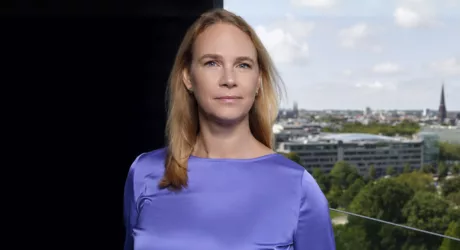Initiatives in social, infrastructural and economic tasks and opportunities are being combined increasingly, and with growing ambition, in a Smart City approach. From smart traffic lights and street lighting to sustainable, collective and intelligent transport solutions and even entire new neighbourhoods and cities. Through the clever use of information technology and data, solutions for large social tasks in connection with urbanisation, climate change, safety, public housing, labour participation, digitalisation, mobility and health are being explored. Thus initiatives are being developed, usually on the basis of public-private partnerships, to:
- improve the accessibility and quality of life in our cities despite densification;
- make clever use of the new technological possibilities for urban management and managing lighting, energy, heating, safety and waste in public spaces;
- increase the accessibility and environmental quality in cities and regions via sustainable smart mobility.
The Smart City
In the Smart City, data is gathered via all kinds of sensors and state-of-the-art technological devices. Using this data and clever links to municipal databases, the Smart City can manage, adjust and develop itself and its facilities efficiently. This also contributes to making the Smart City greener. The aim is to rid city life of all urban inconveniences and reinforce all the good aspects.
- This will provide solutions for the social challenges of this century
- thus narrowing the distance between the inhabitants of the Smart City and the administration as well as
- making the inhabitants of the Smart City feel happy, healthy and energetic, whether at home, at work or while travelling.
When building smart cities, individual ownership will become less and less relevant. This will usher in the transition to a society that operates using collective, social facilities. These will be provided as a service that is matched to the user.
Public authorities, entrepreneurs, scientific and knowledge institutions and city dwellers will work together to achieve this. Not in a laboratory, but in living labs with an eye to the future. The most innovative initiatives are therefore not static but rather adaptive, and can be adjusted in line with the latest state of the art and future legal parameters. Not a simple task.
The legal rationality
What the various initiatives have in common is that they usually involve innovative technologies and concepts. They are however also characterised by a huge diversity. This also means that formulating and implementing a Smart City approach raises different legal questions. Examples include:
- procurement law and state aid law issues that are involved in public-private forms of partnership;
- contracting issues that are involved in these kinds of joint ventures, including the question of which parties are entitled to the intellectual property rights of the Smart City infrastructure;
- issues associated with gathering, storing, and using data that concern the privacy, control and ownership of the data (Big Data, in the Cloud?) and the cyber threat created by increasing digitalisation;
- the financing of the Smart City initiative and the possible issues related to subsidy regulations that are linked to this;
- environmental management law issues that are involved in different aspects of the construction of the Smart City;
- the possibility when using new technologies to experiment with the legislation and regulations that apply for instance to public order.
It is important to identify how much room is provided by prevailing European and national legislation and regulations for implementing a Smart City approach and to clearly document the agreements that have been made in this regard.
Pels Rijcken is innovating
As a firm that focuses expressly on public authorities, Pels Rijcken has all the specific legal knowledge in-house that could play a role in Smart City projects and public-private partnerships. We are committed to making innovation and social developments possible in a legally responsible way. We are therefore happy to think along with public authorities who are engaged in formulating a Smart City approach. Our experience is that when the legal possibilities are given careful thought in an early stage, the momentum, interest and administrative commitment is not lost in the implementation of Smart City initiatives. Clear and properly documented agreements provide all the parties concerned with certainty and accordingly with a stable basis for further (public-private) cooperation.

